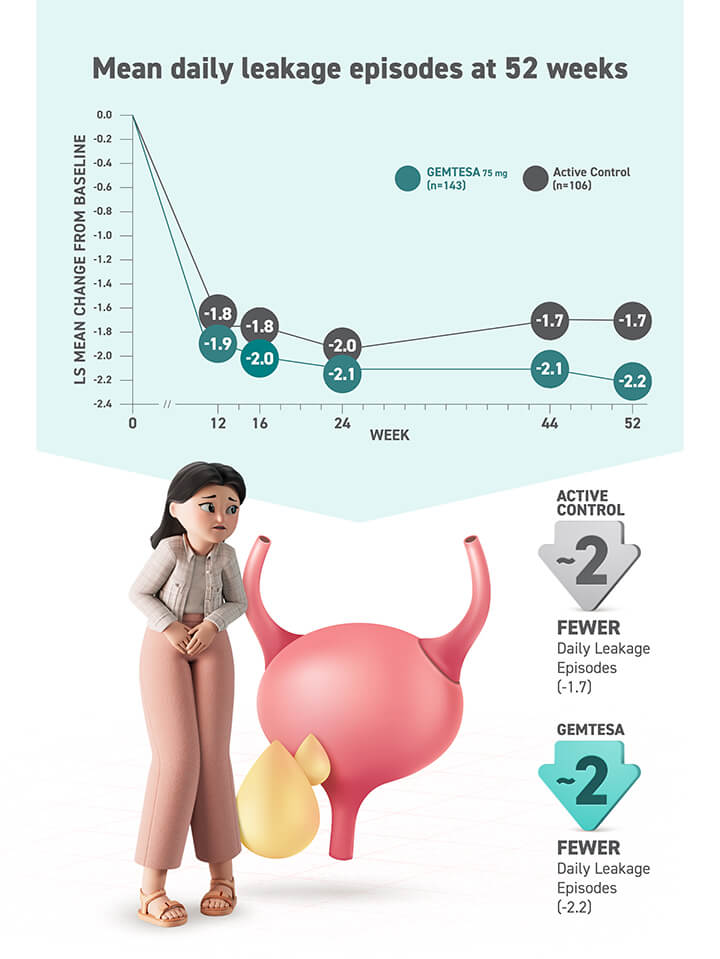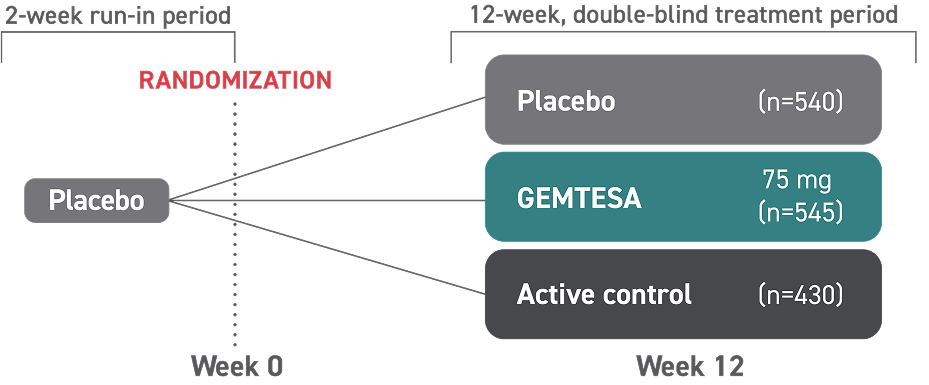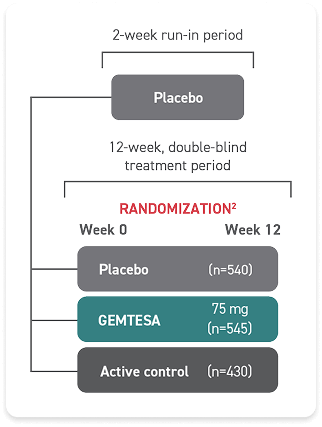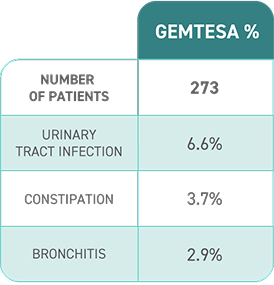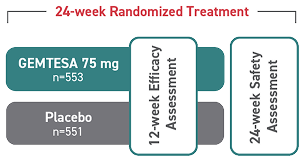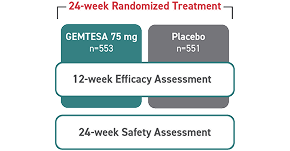Holly Robinson Peete & Rodney Peete
team up to tackle the
stigma of OAB
Holly and Rodney get real about
bladder health and OAB
Holly Robinson Peete & Rodney Peete team up to tackle the stigma of OAB
Holly and Rodney are real patients taking GEMTESA who have been compensated for their time.
Transcript
[RODNEY]: Sorry. Sorry. Sorry, babe.
[RODNEY]: I’m tired of feeling like I have to rearrange everything. Just to make it work.
[HOLLY]: We can’t keep pretending that this isn’t affecting our lives.
[RODNEY]: It’s the constant interruptions. I just, I can’t do it anymore.
[HOLLY]: I deserve better; because this isn’t working.
[RODNEY]: Okay, okay. I admit it. I’ve been brushing this off way too long. I’m ready to talk about what’s really been going on with my overactive bladder.
ON-SCREEN SUPER: [DISCLAIMER] Holly and Rodney are real patients taking GEMTESA (vibegron) who have been compensated for their participation.
Please see Important Safety Information included in this video.
[HOLLY]: We have been married for 30 years. We just celebrated our 30th anniversary.
[RODNEY]: Yes, we did.
[HOLLY]: In the season of our marriage, time is very important. The time we spend is very important. And I want to connect with you, I want to talk to you, I want to go places with you, I want to spend time with you. I don’t want you spending all your time in the bathroom.
Rodney laughs.
[RODNEY]: I feel bad about it. I feel like I’m putting a damper on the night, because I sometimes have to cut the night short.
[HOLLY]: If your first thought is “Where is the restroom? What is my proximity to a actual restroom?” That’s an issue. We like to go to concerts. And you know when you go to a concert and somebody is always getting up in the middle of the row, and you got to get up, and move your stuff, move your - your popcorn and your soda...that’s Rodney Peete. He’s the one that I have to move for. And that was frustrating. Here we are listening to this old school music—
[RODNEY]: Vibing. Yeah.
[HOLLY]: And we’re swaying from side to side, and it’s like “I’ll be right back!” I mean—
[RODNEY]: Uh huh.
[HOLLY]: That is just not—
[RODNEY]: But what’s the number one rule when we go to these concerts? You know the number one rule.
[HOLLY]: What?
[RODNEY]: We have to sit on the aisle. Whether it’s a concert—
[HOLLY]: You have to sit on the aisle!
[RODNEY]: A— a, a baseball, football, basketball game…
[HOLLY]: I don’t have to sit—
[RODNEY]: ...I need to be on the aisle.
[HOLLY]: I—, I used to have to sit on the aisle.
[RODNEY]: Oh, look at you.
[HOLLY]: Now you have to sit on the aisle. So you need to come on deeper into the row with me. That’s what we got to do. We got to get— that’s where we need to be.
[RODNEY]: Get deeper in the row?
[HOLLY]: We gotta get further down into the row.
[RODNEY]: I felt a lot of guilt because I would have to get up at concerts. I would have to interrupt us if we were at a meal or having a deep conversation at dinner. I would have to say “Excuse me. Time out.”
[HOLLY]: “Hold that thought.”
[RODNEY]: “Hold that thought. I’ll be right back.” Yeah, it was frustrating, but I felt like I was holding her back in certain ways.
[HOLLY]: And you weren’t engaging with me. You know, when you have a conversation with someone, and you’re talking about something important—
[RODNEY]: Yeah.
[HOLLY]: And then right in the middle of that it’s like “Wait a second. I’ll be right back.”
[RODNEY]: Yeah.
[RODNEY]: But it— it overtakes you because you’re not allowed to focus. Cause your mind starts to go “When— when’s a good time for me to get up out of this conversation and go to the bathroom?” For most men, and specifically me, um, I didn’t think it was that big of a deal, early on. So I got to get up and go to the bathroom, so I got to interrupt my movie and run and try not miss the best part of the movie, so I’m a little bit late. I didn’t think it was a big deal until it really started to disrupt my life.
[HOLLY]: Mhm.
[RODNEY]: And, at that point it was “I really have to do something about this.”
[HOLLY]: Yeah. And you needed to talk to a doctor. And that’s the first thing because there’s— listen, when it’s your wife telling you, “I think you have these symptoms that I recognize.” it’s kind of like “wah wah wah wah wah wah.” But when you go to a doctor…
[RODNEY]: Yeah
[HOLLY]: And when a doctor talks to you, and breaks it down, there’s something else that happens.
[RODNEY]: Mhm.
[HOLLY]: And I think you can hear it better. I’ve taken control of my health, I’ve spoken to a doctor about my OAB symptoms, and I was noticing that Rodney was a little bit more hesitant to have that conversation with his doctor. And so I gently nudged him.
[RODNEY]: Gently. When I finally had the conversation with my doctor, and he basically told me that there is help. There’s help. And, more importantly, I’m not the only one going through this. When the doctor told me GEMTESA could be a good option for me, I was so relieved. Oh! so relieved.
[HOLLY]: I was relieved too. We were relieved together.
ANIMATION: Super and GEMTESA logo appear (logo to remain on screen for remainder of video).
ON-SCREEN SUPER: GEMTESA is a prescription medicine used to treat the following symptoms due to a condition called overactive bladder (OAB) in adults, and in adult males taking medicine for benign prostatic hyperplasia (BPH): leakage episodes, urgency, and frequency.
[VOICEOVER]: Do not take GEMTESA if you are allergic to vibegron or any of the ingredients in GEMTESA.
ON-SCREEN SUPER: Do not take GEMTESA if you are allergic to vibegron or any other ingredients in GEMTESA.
[VOICEOVER]: GEMTESA may cause serious side effects including inability to empty your bladder and/or angiodema. Stop using GEMTESA and get emergency medical help right away if you have symptoms of angioedema or trouble breathing.
ON-SCREEN SUPER: GEMTESA may cause serious side effects including inability to empty your bladder and/or angiodema. Stop using GEMTESA and get emergency medical help right away if you have symptoms of angioedema or trouble breathing.
Stop using GEMTESA and get emergency medical help right away if you have symptoms of angioedema or trouble breathing.
[VOICEOVER]: The most common side effects of GEMTESA include headache, urinary tract infection, nasal congestion, sore throat or runny nose, diarrhea, nausea and upper respiratory tract infection. These are not all the possible side effects of GEMTESA.
ON-SCREEN SUPER: The most common side effects of GEMTESA include headache, urinary tract infection, nasal congestion, sore throat or runny nose, diarrhea, nausea and upper respiratory tract infection.
These are not all the possible side effects of GEMTESA.
ON-SCREEN SUPER: Please continue watching for Important Safety Information at the end of this video. [HOLLY]: I’ve been using GEMTESA for a while, I’ve got my symptoms more under control. Once Rodney was able to begin managing his symptoms, that just opened up a whole new world for us. We didn’t have to plan around bathrooms, we could go to concerts again, we could go to the baseball game without you getting up so many times.
[RODNEY]: We don’t have to sit on the aisle seat.
[HOLLY]: Yeah. We’re 30 years in and now we’ve got so much more fun things to do.
[RODNEY]: Can I say I appreciate you?
[HOLLY]: You can.
[RODNEY]: I— yeah.
[HOLLY]: Say it louder!
[RODNEY]: That you didn’t— I appreciate you not letting it go because I know you probably got tired of just saying it over and over and over again, and—
[HOLLY]: And then you went.
[RODNEY]: “Go to the doctor. Go to the doctor.”
[HOLLY]: Bring it in.
[RODNEY]: “Go—” Ahh, yeah. See— I gotta, I gotta listen to you more often.
ANIMATION: Time To Go and GEMTESA Logo + Super
ON-SCREEN SUPER: One honest conversation can make all the difference. It’s Time to Go and Put Yourself First.
Talk to your doctor about overactive bladder symptoms and see if GEMTESA is right for you.
ANIMATION: ISI Scroll with VO
What is GEMTESA?
GEMTESA is a prescription medicine used to treat the following symptoms due to a condition called overactive bladder in adults, and in adult males taking medicine for benign prostatic hyperplasia (BPH):
- urge urinary incontinence: a strong need to urinate with leaking or wetting accidents
- urgency: the need to urinate right away
- frequency: urinating often
It is not known if GEMTESA is safe and effective in children.
IMPORTANT SAFETY INFORMATION
Do not take GEMTESA (vibegron) if you are allergic to vibegron or any of the ingredients in GEMTESA.
Before you take GEMTESA, tell your doctor about all your medical conditions, including if you have liver problems; have kidney problems; have trouble emptying your bladder or you have a weak urine stream; take medicines that contain digoxin; are pregnant or plan to become pregnant (it is not known if GEMTESA will harm your unborn baby; talk to your doctor if you are pregnant or plan to become pregnant); are breastfeeding or plan to breastfeed (it is not known if GEMTESA passes into your breast milk; talk to your doctor about the best way to feed your baby if you take GEMTESA).
Tell your doctor about all the medicines you take, including prescription and over-the-counter medicines, vitamins, and herbal supplements. Know the medicines you take. Keep a list of them to show your doctor and pharmacist when you get a new medicine.
What are the possible side effects of GEMTESA?
GEMTESA may cause serious side effects including:
- inability to empty your bladder (urinary retention). GEMTESA may increase your chances of not being able to empty your bladder, especially if you have bladder outlet obstruction or take other medicines for treatment of overactive bladder. Tell your doctor right away if you are unable to empty your bladder.
- angioedema. GEMTESA may cause an allergic reaction with swelling of the lips, face, tongue, or throat, with or without difficulty breathing and may be life-threatening. Stop using GEMTESA and get emergency medical help right away if you have symptoms of angioedema or trouble breathing.
The most common side effects of GEMTESA include headache, urinary tract infection, nasal congestion, sore throat or runny nose, diarrhea, nausea and upper respiratory tract infection. These are not all the possible side effects of GEMTESA. For more information, ask your doctor or pharmacist.
Call your doctor for medical advice about side effects. You may report side effects to FDA at 1-800-FDA-1088.
Please see full Product Information at www.GEMTESA.com/PI.
Holly and Rodney get real about bladder health and OAB
Holly and Rodney are real patients taking GEMTESA who have been compensated for their time.
Ready to prioritize bladder health?
Use the self-assessment tool to review your symptoms, sign up to have your results emailed to you, and receive a handy discussion guide to help you start the conversation with your doctor.
Tackling OAB with Rodney Peete
Transcript
ANIMATION: Time To Go and GEMTESA Logo + Super
ON-SCREEN SUPER: Rodney’s Go-Getter Journey
ON-SCREEN SUPER: [DISCLAIMER] Rodney is a real patient taking GEMTESA (vibegron) who has been compensated for his participation.
[RODNEY]: There were small ways in which OAB disrupted my life. I do a radio show for 3 hours every single day. And, in those three hours, I would have to go to the bathroom probably about 10 times. It really hurt my focus because all I could think about was “let’s get to break so I can go to the bathroom.” Going to sporting events was very difficult, which we like to do as a family. But when we go, often times, I will miss a full inning, or I’ll miss a big play, because I’m waiting in line for the bathroom. I was in a little bit of a denial. I wanted to hide it. I would tell stories like “I’m going to get some popcorn.” or “I’m going to get a drink at the concession stand,” or “I just gotta make a phone call.” and I’d really be running to the bathroom.
ON-SCREEN SUPER: [DISCLAIMER] Rodney Peete and his wife, Holly Robinson Peete.
Holly is a real patient taking GEMTESA (vibegron) who has been compensated for her participation.
[RODNEY]: My wife came to me. We were at a game and she said “Honey, this is the fifth time you went to the bathroom.” And, as much as I was in denial, I couldn’t argue with that. And I knew I had to get this checked out. Being an athlete sometimes you’re just taught to get over it or play hurt. Or, just, forget about the pain, forget about the symptoms, just go do it. And I lived my life that way for such a long, long time that I thought everything was normal. And, in the end, it wasn’t normal. It wasn’t a normal part of aging and I needed to get some help. Holly recognizing that in me, led me to the right decision. Sometimes as a male— your ego gets in the way. Having an overactive bladder is not something that you just want to throw out there in conversations, but it’s a real part of life. And, even around my friends, my male friends, it would be jokes about it. You know, we would actually have bets on who went to the bathroom the most at a football game. At the same time, it is something serious that you need to deal with. And, as my situation progressed, I felt more comfortable talking about it with my male friends. I was diagnosed with BPH—benign prostatic hyperplasia. And even with the treatment for BPH, I still had OAB symptoms of urgency, frequency, and leakage episodes. My doctor recommended GEMTESA which is proven to treat those OAB symptoms in men being treated for BPH. When I finally went to the doctor and got my diagnosis of OAB, I actually was relieved.
ON-SCREEN SUPER: Individual results may vary.
ON-SCREEN SUPER: GEMTESA Logo (will stay on for the remainder of the video).
[RODNEY]: When my doctor prescribed GEMTESA to me, I knew how it had helped Holly, and I was just praying that I would get those same results.
[VOICEOVER]: GEMTESA is a prescription medicine used to treat the following symptoms due to a condition called overactive bladder (OAB).
In adults, and in adult males taking medicine for benign prostatic hyperplasia (BPH): leakage episodes, urgency and frequency.
ON-SCREEN SUPER: GEMTESA is a prescription medicine used to treat the following symptoms due to a condition called overactive bladder (OAB).
In adults, and in adult males taking medicine for benign prostatic hyperplasia (BPH): leakage episodes, urgency and frequency.
[VOICEOVER]: Do not take GEMTESA if you are allergic to vibegron or any of the ingredients in GEMTESA.
Stop using GEMTESA and get emergency medical help right away if you have symptoms of angioedema or trouble breathing.
ON-SCREEN SUPER: Do not take GEMTESA if you are allergic to vibegron or any of the ingredients in GEMTESA.
Stop using GEMTESA and get emergency medical help right away if you have symptoms of angioedema or trouble breathing.
[VOICEOVER]: GEMTESA may cause serious side effects including inability to empty your bladder and/or angiodema. Stop using GEMTESA and get emergency medical help right away if you have symptoms of angioedema or trouble breathing.
Stop using GEMTESA and get emergency medical help right away if you have symptoms of angioedema or trouble breathing.
ON-SCREEN SUPER: GEMTESA may cause serious side effects including inability to empty your bladder and/or angiodema. Stop using GEMTESA and get emergency medical help right away if you have symptoms of angioedema or trouble breathing.
Stop using GEMTESA and get emergency medical help right away if you have symptoms of angioedema or trouble breathing.
[VOICEOVER]: The most common side effects of GEMTESA include headache, urinary tract infection, nasal congestion, sore throat or runny nose, diarrhea, nausea and upper respiratory tract infection. These are not all the possible side effects of GEMTESA.
ON-SCREEN SUPER: The most common side effects of GEMTESA include headache, urinary tract infection, nasal congestion, sore throat or runny nose, diarrhea, nausea and upper respiratory tract infection.
These are not all the possible side effects of GEMTESA.
[RODNEY]: Being on GEMTESA has allowed me to be more present in my life. I mean if we’re at a ball game, I’m thinking less about going to the bathroom, and focused on what’s happening in the game because my symptoms are being managed. Watching Holly the last 3 years while she’s gone on her journey with GEMTESA—I was very encouraged. And it gave me the courage to start my own journey.
After years of denial I was able to put that aside and get my act together. I’m so proud that I went to the doctor and took this step because I am putting myself first. And I’m very excited about it.
ON-SCREEN SUPER: One honest conversation can make all the difference. It’s Time to Go and Put Yourself First.
Talk to your doctor about overactive bladder symptoms and see if GEMTESA is right for you.
ANIMATION: Time To Go and GEMTESA Logo + Super
[NARRATOR VOICE-OVER]
What is GEMTESA?
GEMTESA is a prescription medicine used to treat the following symptoms due to a condition called overactive bladder in adults, and in adult males taking medicine for benign prostatic hyperplasia (BPH):
- urge urinary incontinence: a strong need to urinate with leaking or wetting accidents
- urgency: the need to urinate right away
- frequency: urinating often
It is not known if GEMTESA is safe and effective in children.
IMPORTANT SAFETY INFORMATION
Do not take GEMTESA (vibegron) if you are allergic to vibegron or any of the ingredients in GEMTESA.
Before you take GEMTESA, tell your doctor about all your medical conditions, including if you have liver problems; have kidney problems; have trouble emptying your bladder or you have a weak urine stream; take medicines that contain digoxin; are pregnant or plan to become pregnant (it is not known if GEMTESA will harm your unborn baby; talk to your doctor if you are pregnant or plan to become pregnant); are breastfeeding or plan to breastfeed (it is not known if GEMTESA passes into your breast milk; talk to your doctor about the best way to feed your baby if you take GEMTESA).
Tell your doctor about all the medicines you take, including prescription and over-the-counter medicines, vitamins, and herbal supplements. Know the medicines you take. Keep a list of them to show your doctor and pharmacist when you get a new medicine.
What are the possible side effects of GEMTESA?
GEMTESA may cause serious side effects including:
- inability to empty your bladder (urinary retention). GEMTESA may increase your chances of not being able to empty your bladder, especially if you have bladder outlet obstruction or take other medicines for treatment of overactive bladder. Tell your doctor right away if you are unable to empty your bladder.
- angioedema. GEMTESA may cause an allergic reaction with swelling of the lips, face, tongue, or throat, with or without difficulty breathing and may be life-threatening. Stop using GEMTESA and get emergency medical help right away if you have symptoms of angioedema or trouble breathing.
The most common side effects of GEMTESA include headache, urinary tract infection, nasal congestion, sore throat or runny nose, diarrhea, nausea and upper respiratory tract infection. These are not all the possible side effects of GEMTESA. For more information, ask your doctor or pharmacist.
Call your doctor for medical advice about side effects. You may report side effects to FDA at 1-800-FDA-1088.
Please see full Product Information at www.GEMTESA.com/PI.
Living with OAB: Lessons from the GEMTESA Go-Getters
Through some prodding, and a whole lot of support, my wife Holly pointed out my symptoms and urged me to see a doctor...
That kind of support made all the difference.

Former professional football player, real OAB patient, and compensated GEMTESA spokesperson.

Be open and up front with your
doctor. The more they know, the
more they may be able to help you!

Actor, real OAB patient, and compensated GEMTESA spokesperson.

At a game with my family, I would miss a full inning or a big play because I was waiting in line for the bathroom.

Former professional football player, real OAB patient, and compensated GEMTESA spokesperson.

I tell people, you don’t have to run — just move forward. And you can start by talking to your doctor about OAB!

Bruce is a real patient taking GEMTESA who has been compensated for his time.

Remembering to take GEMTESA daily is easy for me because I set a reminder on my phone for breakfast time. Even when I’m traveling, having that reminder never fails!

Diane is a real patient taking GEMTESA who has been compensated for her time.

I use the Let’s Go Tracker to track my progress and I take it with me to my urologist. That way we can look at the results together and see how I’m doing.

Lois is a real patient taking GEMTESA who has been compensated for her time.

OAB symptoms may worsen with age. Mine did, and that led to some embarrassing moments. Don’t wait, speak up now.

Dar is a real patient taking GEMTESA who has been compensated for her time.

Are you a GEMTESA Go‑Getter?
By sharing your GEMTESA story, you can help break the stigma of living with OAB and inspire other patients to GO GET help. After you submit your info, you'll be contacted by one of our partners and your story may be featured here or on our social media channels!
Thank you for your interest in sharing your experience with GEMTESA for use in our promotional activities. By contacting us, you confirm that you:
Are over the age of 18
Live in the United States
Have been diagnosed with OAB
Have been prescribed GEMTESA for overactive bladder
Are currently taking GEMTESA as prescribed by your healthcare provider
Follow us:
Sign up to see if you are eligible for savings and to learn more about available resources with GEMTESA Patient Support™ (GPS).

